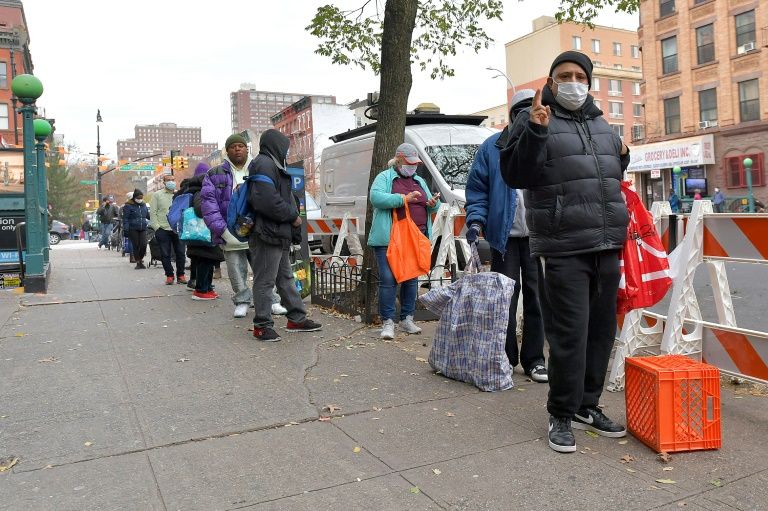Falling US jobless claims bright spot in troubled labor market
Washington (AFP) – A drop in new applications for US unemployment benefits offered small comfort to the millions of Americans who will see pandemic aid expire without an agreement in Congress on a new relief program.
With just weeks left before President-elect Joe Biden takes office, Republicans and Democrats remain at odds over what should be included in a new spending package to help businesses and families struggling from the damage inflicted by Covid-19.
New US jobless claims fell to 712,000 last week, a better-than-expected decline of 75,000, seasonally-adjusted, the Labor Department reported Thursday.
Economists had been anticipating the number of new claims to hold steady after spiking in the week ended November 21 to an upwardly revised 787,000.
Applications for Pandemic Unemployment Assistance — which goes to people who normally would not qualify for benefits — dropped by just over 30,000 to 288,701 last week, meaning there were more than a million new claims for some form of benefit last week.
The report showed that through the week ended November 14, 20.2 million people continued to receive some form of unemployment benefit — a decline of about 350,000, not seasonally adjusted — including under the special pandemic programs that will terminate at the end of the year.
The fate of those programs remains uncertain as Congress has yet to break the impasse over a new federal relief plan that can be approved in the “lame duck” session before Biden takes charge of the White House.
Democratic leaders in Congress have thrown their support behind a $908 billion bipartisan proposal, at least as a starting point for discussions, and Biden too said it would be a good first step.
But Republican Senate Majority Leader Mitch McConnell continues to press for a much more limited plan of about $500 billion that repurposes unspent funds from the $2.2 trillion CARES Act approved in March.
– Flawed data? –
Amid continued signs the labor market recovery has stalled, as surging Covid-19 cases has prompted more business restrictions, the big drop in jobless claims could be a blip since the data are for the week that include the Thanksgiving holiday, which could skew the figures.
“The plunge in initial claims does not refute the idea that the trend is rising; we expected a sharp fall because of the difficulty of adjusting for Thanksgiving,” said Ian Shepherdson of Pantheon Macroeconomics.
He warned that “initial claims likely will rebound strongly next week, probably rising above the 800,000 mark for the first time in eight weeks.”
Rubeela Farooqi, chief US economist at High Frequency Economics, highlighted the danger posed by the potential for rising layoffs in coming weeks.
“The hit to household balance sheets from job and income loss as well as expiring federal benefits is a downside risk for spending going forward.”
The US Government Accountability Office (GAO), which reports to Congress, in a report early this week found flaws in the Labor Department’s jobless claims data, which GAO said could be overstated due to the flood of applications during the pandemic.
However, economist Robert Frick of Navy Federal Credit Union, said even if the figures are inflated, the trend remains historically large.
“But roughly speaking, weekly layoffs continue at a higher level than during the Great Recession, and have plateaued at a level more than twice as high as that seen before the pandemic,” he said.
Disclaimer: Validity of the above story is for 7 Days from original date of publishing. Source: AFP.


